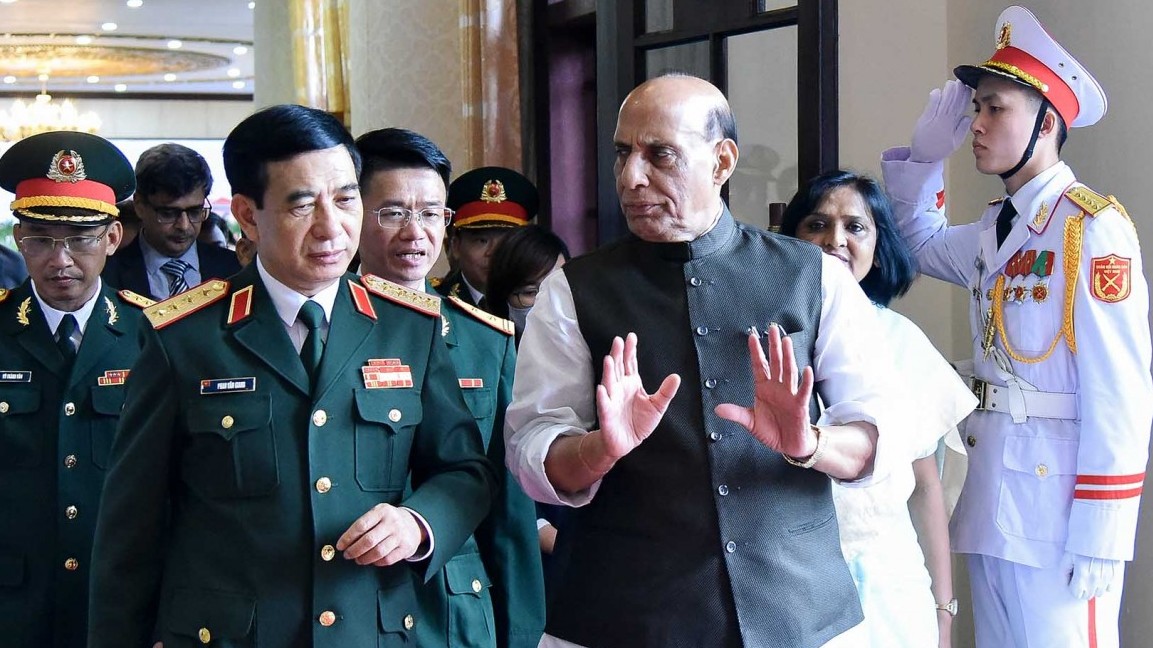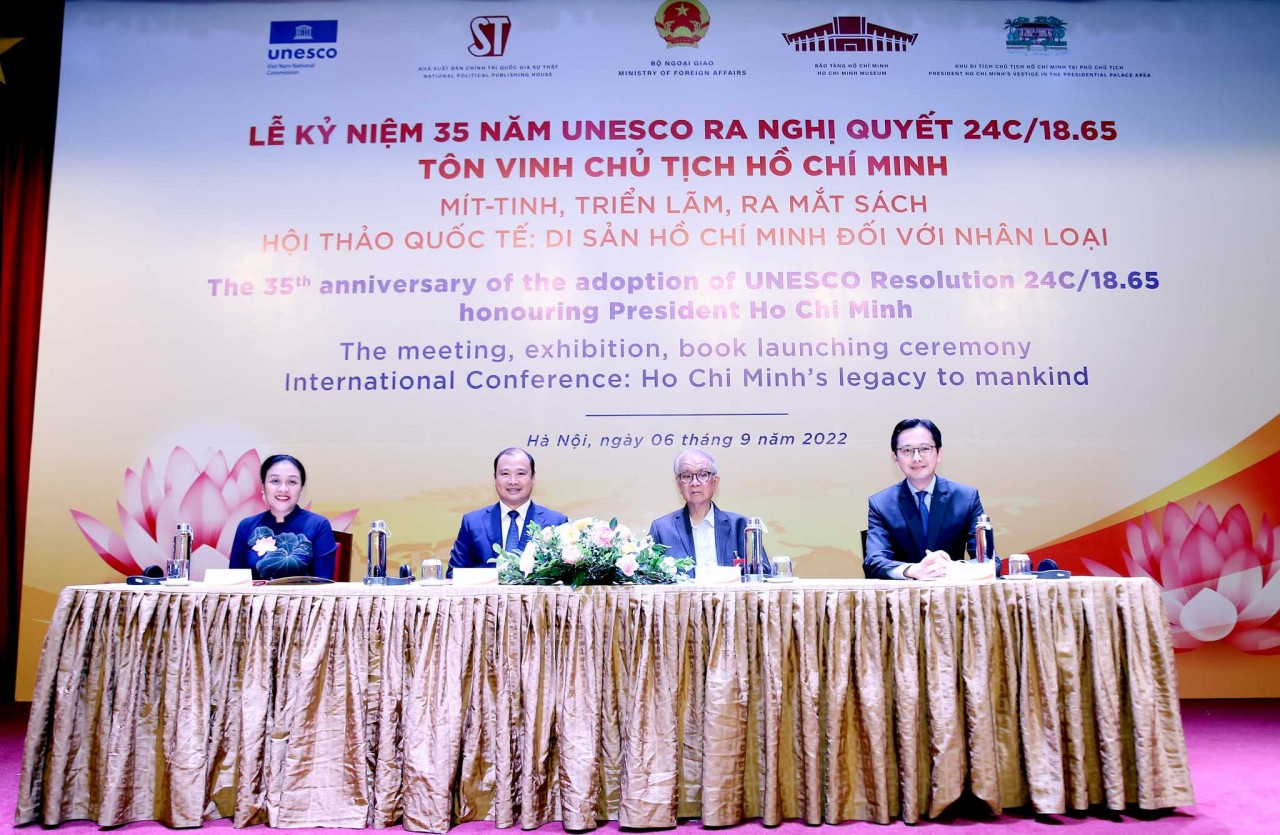
Indian scholar: Ho Chi Minh and India-Vietnam Relations
Latest
 |
| International Conference "Ho Chi Minh's legacy to mankind" was held in Hanoi, on Sept. 6, on the occasion of the 35th anniversary of UNESCO’s Resolution honouring President Ho Chi Minh as a Hero of National Liberation and a Great Man of Culture of Vietnam. (Photo: WVR/Quang Hoa) |
Ho Chi Minh visited India three times - first in 1911, then in 1946 while he was going to France for peace dialogues and then finally in 1958 as an official visit as the President of the Democratic Republic of Vietnam. Prime Minister of India Jawaharlal Nehru welcomed him as a “great revolutionary leader”. He further remarked that “We have met a person who is part of Asian history. We meet such a great man, and we meet a period of history. Therefore, we not only enrich our thoughts but also feel more honored. Meeting President Ho is such an experience.”
However brief, a mention must also be made of the fact that India was the Chairman of the International Commission for Supervision and Control (ICSC); which was formed pursuant to the Geneva Accords to facilitate the peace process in Vietnam after the First Indochina War. A new nation that was India supported Vietnam’s independence from France, viewing it as being similar to India’s own struggle against British colonialism.
The then Prime Minister of India Nehru embarked on a tour of China and Indochina in 1954 during which he visited North and South Vietnam. He was one of the first visitors to North Vietnam after its victory against the French at Dien Bien Phu. Nehru sent a detailed report describing his tour to Burmese Prime Minister U Nu on 16th November 1954. He wrote, “The person who impressed me most was President Ho Chi Minh of the Democratic Republic of Vietnam, who came to see me at Hanoi. Hanoi had passed into his hands just five days previous to my arrival. This was a peaceful and very disciplined transfer from the French to the Viet Minh. Ho Chi Minh impressed me as an unusually frank, straight- forward and likable person. Although he was engaged in a war for seven years, against the French, he was the very reverse of a war- like person. He struck me as a man of peace and goodwill. He did not say a word against the French to me. It was evident that Viet Minh was well- organized and disciplined.”
At that time despite the fact that India was the Chairman of the International Commission of Control and Supervision, which demanded strict impartiality in dealing with North and South Vietnam, for implementing the peace process, India seemed ideologically clearly tilted in favor of Viet Minh and President Ho. India established consular relations with North Vietnam as early as in 1956. The charisma of President Ho was such that he was accepted, loved and respected as one of our own and the cause of Vietnamese people and their struggles were ours. This is why, Mrs Rameshwari Nehru, Chairman of the President Ho Chi Minh Reception Committee, while welcoming President Ho during his official visit to India in February 1958 to bolster solidarity among countries in Asia and Africa remarked, “You are loved and respected by us, the citizens of India as much as by your own people.”
President Ho Chi Minh’s and Vietnam’s conviviality with India intensified even further when Mrs Indira Gandhi came to power. She pledged India’s support and commitment to fight for the “inalienable rights of all peoples, especially those of Vietnamese people, to national independence and freedom.”. India whole-heartedly welcomed the Paris Peace Accord, which was signed on 27 January 1973 for the purpose of re-unification of the Vietnams- North and South.
With the completion of the re-unification of Vietnam in January 1976, and the creation of the Socialist Republic of Vietnam, the Indian leadership did not hesitate even to invite the wrath of the U.S. at a time when the Cold War was at its peak, for the sake of expressing a rare solidarity as two Asian countries sharing very old civilizational linkages and ideological affinities. Though both Chacha Nehru and Uncle Ho passed away in 1960s, the foundation on which they had established Indo- Vietnam relations was laden with honest fraternal feelings and a strong commitment for future joint endeavors to bring in peace and prosperity for its peoples.
Vietnam supports India’s plea for permanent membership in the United Nations Security Council. Vietnam understood that in 1998 when India had to go nuclear, there were obviously good reasons for it and at a time when the world put sanctions on India, Vietnam stood by India. On matters of terrorism too, Vietnam unequivocally supports India’s zero tolerance policy. From openly condemning the Mumbai attacks to extending cooperation for working in antiterrorism activities, Vietnam has been a steadfast partner of India in this regard too.
India and Vietnam share similar apprehensions and ramifications of being lower riparian countries of Brahmaputra and Mekong respectively. India and Vietnam support free and open Indo- Pacific with freedom of navigation and over-flight, turning the East Sea and Asia- Pacific into a stable, cooperate and developed region. Vietnam supports India Project Mausam and Vision SAGAR which envisage to deepen connectivity of India with other littorals in the Indian Ocean region and are pet projects of the present government.
During the period 2016-2021, there have been 7 high- level visits between Vietnam and India. This is the highest number of visits by Vietnam with any other country in the world during this period. In 2016, Vietnam’s relations with India were elevated to the level of Comprehensive Strategic Partnership from Strategic Partnership.
In 2017, India and Vietnam celebrated the year of friendship to mark the 45th anniversary of the establishment of the establishment of their diplomatic ties and 10th anniversary of their Strategic Partnership. In 2018, Vietnamese Prime Minister Nguyen Xuan Phuc visited India and their Delhi Declaration committed them to work closely together of common regional and international security issues of mutual concern and ensure an open, transparent, inclusive and rules-based regional architecture through ASEAN-led frameworks with India such as ADMM Plus, ARF, EAS, PMC+1, etc.In August 2018, the 3rd Indian Ocean Conference was held in Hanoi and the then External Affairs Minister of India, Smt. Sushma Swaraj attended the Conference and stated, “We intend to accelerate the establishment of direct shipping routes between the sea ports of India and Vietnam. We agreed on the importance of the early conclusion of an ASEAN-India Maritime Transport Cooperation Agreement. India and Vietnam are connected not only by common waters that was our shores but also by a shared vision for peace and prosperity.” After assuming office as the President of India, Shri Ram Nath Kovind chose Vietnam for his first official visit to any Southeast Asian country in 2018.
The new emerging areas of cooperation between India and Vietnam are Science and Technology, Human Resource Development, cooperation between Indian Space Research Organization and Vietnam’s National Remote Sensing Department, nuclear cooperation, shared vision in line with India’s Indo- Pacific Oceans Initiative and the ASEAN’s Outlook on Indo- Pacific to achieve shared security, prosperity and growth.
India’s economic relations with Vietnam need immediate attention. In April-January 2021-2022 period, India’s bilateral trade with Vietnam was 11331.15 million USD, and the balance of trade was negative for India to the tune of 191.29 million USD. This is the first time in the history of India- Vietnam relations recorded in modern times that India is suffering a negative balance of trade vis-à-vis Vietnam. According to the UNDP, Vietnam has created a legendary story in poverty reduction, with a Human Development Index of 0.63 in 2019. It also ranked Vietnam 8th on a list of the world’s best economies to invest. According to the UN Sustainable Development Report 2020, Vietnam is the only Southeast Asian country to achieve UN action targets and recorded a positive economic growth even during the peak of COVID.
To conclude, I would like to say that the past of India-Vietnam relations was determined by people to people relations, solidarity and similar views on world issues and the future of India- Vietnam relations will also be singularly determined by people to people contact. India is well aware of it and offers Vietnamese a host of scholarships such as under Indian Technical and Economic Cooperation Programs, Civilian and Technical Cooperation Scheme of Colombo Plan, ICCR Scholarships, Education Exchange Programs, Cultural Exchange Programs, Mekong Ganga Cooperation Scholarship Scheme, General Scholarship Scheme and Scholarships for Buddhist and Sanskrit Studies. The recent initiative of the Government of India which was launched in October 2019 to offer PhD fellowship program in association with 23 IITs for 1000 students from ASEAN countries, is also getting good response from Vietnam. Vietnam has proposed to establish the Vietnam Cultural Centre in India. India is also providing technical assistance worth 2.25 million USD for conservation and restoration of ancient Cham monuments in Quang Nam Province of Vietnam. During COVID, Indian Navy Ship delivered oxygen and oxygen concentrators for Vietnamese people. Such solidarity and fraternal ties along with deepening of their economic relations and ensuring timely implementation of the grants-in-aid and lines of credit that have been announced in various sectors hold the key to a prosperous Indo-Vietnam relations.










